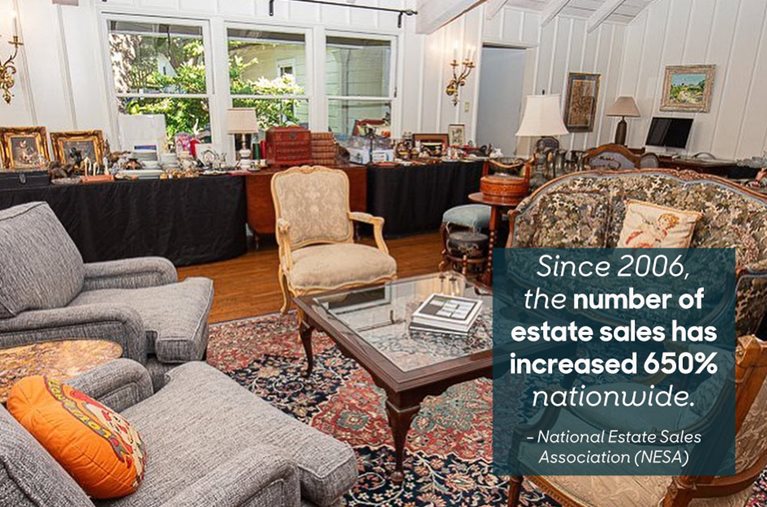
Estate Sale Planning: 12 Simple Tips for Netting More Cash
Real Estate Advice
Have a house full of things you’re looking to offload in one fell swoop? Consider holding an estate sale! Estate sales differ from your run-of-the-mill garage sale or yard sale and are a great way to make money on a high volume of household items — from vintage furniture to everyday items like kitchenware. Curious about the steps involved in estate sale planning? You’ve come to the right place. Here’s everything you need to know about the who, what, when, where, why, and how of holding an estate sale.
What Is an Estate Sale?
An estate sale is essentially a large sale of someone’s personal possessions — similar to a garage sale but on a bigger scale. Estate sales include a much higher volume of sale items and can feature high-ticket items, whereas garage or yard sales are usually just reserved for offloading a handful of second-hand bargain items.
Why Do People Have Estate Sales?
People often hold estate sales after the death of a loved one as a way to liquidate their personal assets. However, folks also turn to estate sales as a way to declutter before a move, make extra money, or help elderly parents relocate — though these are technically called tag sales if the owner of the belongings is still alive. Although the term “estate sale” may sound slightly outdated, its popularity holds steadfast, especially as the cost of living rises. People continue to switch up their living situations, relocate to other cities, and, sadly, deal with the loss of loved ones.
How To Make Your Estate Sale as Smooth and Successful as Possible
Although garage sales and estate sales are similar, estate sale planning is much more involved — from inventory and pricing to advertising and day-of-sale operations. Every sale is unique, depending on the reason, location, items offered, and the buyers it attracts.
Whatever your situation, here are our best tips for how to have an estate sale — and how to make sure everything goes as smoothly as possible.

Thorough preparation is key to successful estate sale planning, so make sure to take inventory of each item and record its price before you open your doors to potential buyers.
1. Take Inventory of the Items You Want To Sell.
First things first: You’ve got to decide what you want to keep, sell, or simply get rid of. If you’re holding an estate sale after a death, you’re likely looking to liquidate as many of the assets as possible. However, if you’re having the estate sale because you’re downsizing or moving, you’ll probably want to take a more discerning approach. Be sure to check the house from top to bottom for items to sell. You may be surprised at how many things you forgot you even owned!
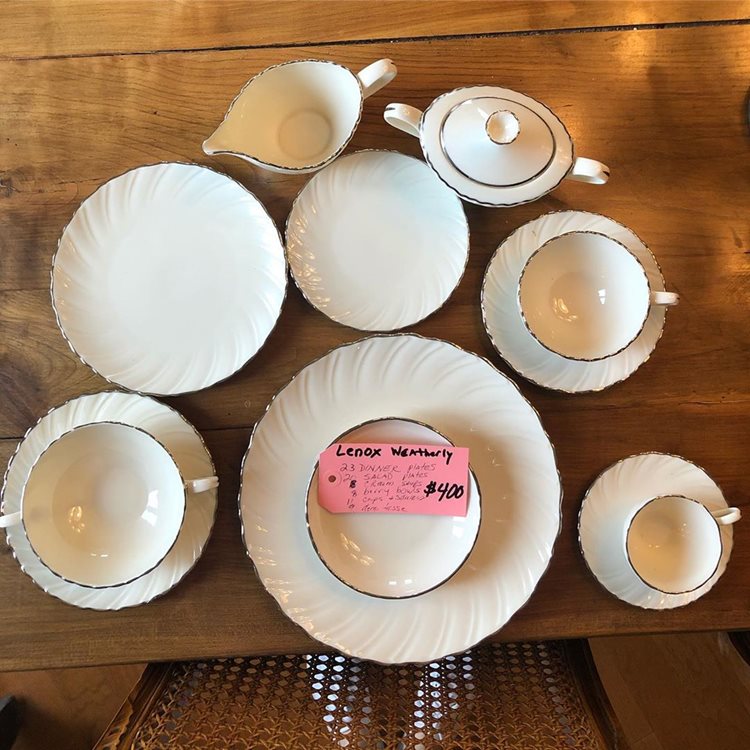
(Source: @handhestatesales via instagram)
Include as much detail as possible on your price tags — particularly if the items are a bit costly — so your potential buyers know the value of the pieces they’re considering.
2. Price Items Strategically.
This is probably the trickiest part of how to have an estate sale, especially if you’re selling items that belonged to someone else. While rare items and antiques have a somewhat consistent price, many items will vary in value depending on where the estate sale is being held. Something that fetches a high dollar in a quaint New England town may be considered a throwaway in Florida — and vice versa.
Remember that buyers are objective, so try not to let emotional attachment dictate price. Determine the highest amount you can reasonably ask and the lowest price that you’re willing to accept. For items you might otherwise toss or that don’t have obvious significant value, consider bargain pricing or grouping them on a table or in a bin where all items have a flat price of $1, $5, or $10.
| Pro Tip: It’s always a good idea to include details about the item on the price tag, so the potential buyer understands the item’s worth. |
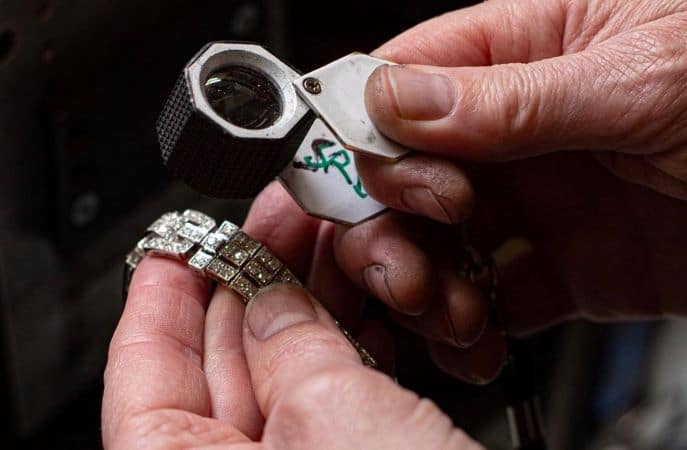
(Source: @marthalerjewelers via instagram)
A professional appraisal helps make sure you don’t underprice — or overprice — your estate sale items.
3. Get Professional Appraisals for Items of Value.
We strongly recommend getting a professional appraisal of everything you’re hoping to offer in your estate sale. Professional appraisers will make sure you don’t underprice — or overprice — your items. Plus, they know the ins and outs of how to have an estate sale, including what certain items are worth in your specific area, and can help determine if things like collector’s items and jewelry are the real deal.
Remember, for some people, estate sales are more than just a pastime; they’re an entire hobby with their own culture and norms. The most serious frequenters know that professional pricing is a key part of how to have an estate sale that’s taken seriously.
A little TLC goes a long way toward improving the look — not to mention the price! — of a potential estate sale treasure.
4. Decide If Anything Is Worth a Quick Clean or Fix.
You’d be surprised what a smidge of TLC can do. A simple shine, lick of paint, quick wash, or easy mend can turn an item destined for the trash into something worth selling. That said, not everything is worth salvaging, so weigh the time and materials it will take to fix or prepare the item versus how much it may potentially garner.
5. Consider Temporary Storage.
Estate sales seldom happen overnight. A temporary storage option can help relieve time pressure and free up space during the estate sale planning process. You can use a self-storage unit to store items securely while you’re planning your estate sale.
Even better: Have a PODS portable storage container delivered to you, so you can store your items at home or onsite where the estate sale is taking place. This gives you 24/7 access to your inventory while you’re sorting, pricing, and prepping for your estate sale. If you need more time before holding the sale, you can also have the container taken to a secure PODS Storage Center and then delivered back to your home or another location when you’re ready to stage the estate sale.
6. Hold Your Estate Sale on a Weekend Day.
When you’re considering how to run an estate sale, your foremost goal is to draw prospective buyers — and the best way to do that is to host your estate sale on a weekend. But keep in mind that holiday weekends can be a toss-up, since days off might mean people are traveling out of town. And never hold an estate sale on Christmas or Thanksgiving, no matter what day of the week they happen to fall on.
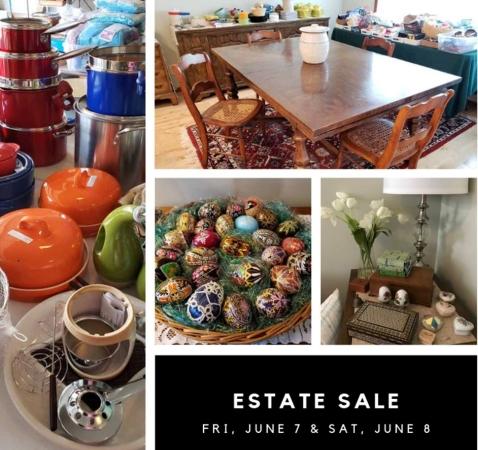
(Source: @changing_spaces_srs via instagram)
Promoting your sale is key to piquing the interest of potential buyers — so be sure to take photos of your most appealing items and share them on social media, on specialty sites, and in your local newspaper.
7. Advertise Your Estate Sale and Include Pictures of Your Best Items.
Part of learning how to have an estate sale is remembering to advertise, which is key to piquing the interest of buyers and getting the word out. There’s always a chance that a handful of people will walk or drive by, but serious buyers scour for the best sales by looking online, on social media, and in newspapers. Be sure to take pictures of your most appealing items, showcase a range of the types of things people will find at your sale, highlight rare items and bargain bins, and triple-check that the date, hours, and address are correct.
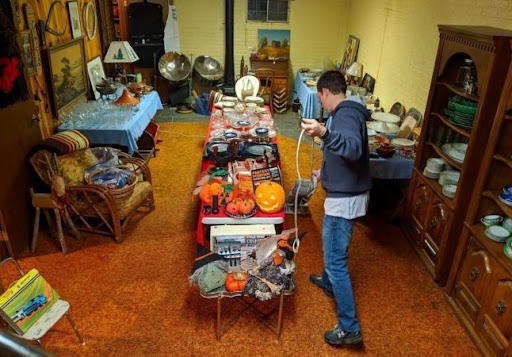
(Source: @changing_spaces_srs via instagram)
Make your estate sale a pleasant experience for guests, with a clean space, clearly marked prices, and easily accessible items.
8. Set Up Your Selling Area Precisely To Maximize Sales.
Presentation of your treasures is a big factor in the success of your estate sale. Be sure to lay everything out so that items are visible, clearly mark prices, arrange any tables or shelves in a way that keeps the flow of foot traffic going, and avoid any layouts that can cause congestion.
If you’re hosting the sale at your home, be sure to clearly mark any items that are not for sale — or tuck them away in a portable container. You could also use a container for display space, since it sits right at ground level, provides shade and protection from the elements, and makes it easy to have a two-day event: If you don’t sell everything on the first day, no need to lug everything back inside and then out again — just lock up the container.
9. Make It Clear Which Areas Are Off Limits.
Estate sales are typically held throughout the entire house — or at least that’s what many prospective buyers think. In their eyes, the estate sale is basically giving them permission to snoop around every inch of the property. So when you’re planning how to organize an estate sale, be sure to clearly mark any areas or items you don’t want strangers rifling through. Your best bet? If you don’t have access to temporary storage, keep off-limit areas out of sight, if possible, by shutting doors and hanging signs that clearly state the areas behind the doors are not included in the sale.
10. Enlist Lots of Help for the Big Day (or Days).
Estate sales are incredibly popular. If the stars align, you may have dozens of people in the house at the same time. Cover the bases in your estate sale planning by being prepared with several helpers that can mingle throughout the home. Even if their sole purpose is to direct all questions to you, that’s still a huge help! But if they want extra friend points, taking some of the stress off of you by acting as additional “cashiers” can really make a big impact!

Local libraries, shelters, and thrift stores are always happy to accept books and other items — just be sure to call first!
11. Decide If You’re Going To Donate, Discard, Auction, or Keep Any Items That Don’t Sell.
In a perfect world, all your items would sell, but that’s rarely the case. Fear not, there are some next steps you can take for unsold items. If you’re really looking to make money, you can arrange to put the items up for auction, or possibly receive a tax credit by donating them to charity. Otherwise, decide if it’s something you might want to keep or would rather just donate or throw away.
12. Familiarize Yourself With Estate Sale Tax Laws.
One of the major ways that estate sales differ from garage sales is that you’re likely to make a lot more money. This means that it’s imperative to know and understand the tax laws as part of how to run an estate sale; you’ll likely owe taxes from the event. In states like Delaware, Alaska, New Hampshire, Oregon, and Montana, you may be exempt from tax of any kind from your estate sale, but this is not the case in other states. Do your due diligence before you open your doors.
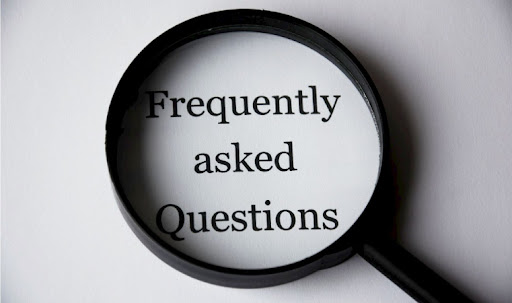
(Source: loufre via Pixabay)
Tax laws related to estate sales vary from state to state, so do your due diligence before you open your doors and start selling.
As you dig into your estate sale planning, you may find that additional concerns come up — and our FAQs can help, so keep reading! In the meantime, remember that with the proper advertising, thorough inventorying, and attention to organizing, your estate sale can be a great success.
Estate Sale FAQs
Q: How do estate sales make money?
A: Just like garage and yard sales do — but on a larger scale. Estate sales typically accept several forms of payment: cash, card, app (like Venmo or PayPal), etc. Many estate sale companies also list items online, so you can actually make purchases without being there in person.
Unlike small garage and yard sales, the owner of an estate sale may end up paying fees (to an estate sale company, to an appraiser, or in taxes, for example), but in the end, it’s typically a worthwhile endeavor.
Q: Do people haggle at estate sales?
A: Yes. Price haggling at an estate sale is part of the fun. Consider this when pricing your items: If an item is special (on paper, not just to you), factor that into the original price, and have in mind the lowest offer you’re willing to take.
Q: Are estate sales cash only?
A: Not necessarily. A key element of how to run an estate sale is making the process as seamless and convenient as possible for your prospective buyers. That means allowing a variety of payment methods — including platforms like Venmo and PayPal. But if you’re not familiar with digital options and don’t have the time or desire to learn, cash is likely the way to go. Just be sure to make it clear in any advertising you do; otherwise, you may lose out on some sales.
Q: Should you go DIY or hire a professional estate sale company?
A: Holding an estate sale isn’t as spontaneous or simple as setting up a quick garage sale. You can either choose to go DIY or hire professionals to help you. A DIY estate sale is a lot of work, but it’ll give you the most control and flexibility during the process. You’ll also get to keep all the profits (minus any taxes due). So as you think about how to organize an estate sale, the DIY route is often the best route if your objective is to make money.
On the other hand, hiring a professional estate sale company can save you a ton of time and effort. But that does come at a price. At a minimum, you’ll have to pay a portion of your profits in the form of a commission rate. That said, some consider it money well spent, especially if the items for sale are not your own or you’re dealing with the death of a loved one and other challenges, such as selling a home or moving to a new place.
Q: What percentage do most estate sale companies take?
A: Commission rates from estate sales vary, but generally fall somewhere between 30 percent and 50 percent of the gross profits. Many companies will work on a predetermined sliding scale, meaning their commission is based on how much you earn from your sale — as your profits increase, their commission rate goes up.
Q: What are some tips for hiring an estate sale company to handle your sale?
A: If you decide to work with the pros, here are a few things to consider before choosing who to hire.
Q: What time of the year is best for estate sales?
A: Surprisingly, perhaps, the winter months are considered optimal, according to most guidance about how to do an estate sale. Why winter? Fewer families are on vacation (except around the holidays, of course), there’s less competition from antiques dealers and resellers, and, since there’s not always a lot of community activity in the colder months, you can take advantage of the cabin fever that often afflicts people in colder climates. Offer some hot chocolate, and you’re in business!
A: As a general rule, yes, haggling is part of the estate sale culture. If you’re going the DIY route in your estate sale planning, you can make the call regarding whether you want to accept negotiations. It’s likely that by the end of the day — or the weekend, if that’s your schedule — you’ll be ready to make some deals in order to offload your merchandise.
The idea of holding an estate sale may seem overwhelming, but there's no need to get stressed out. With these easy-to-follow tips, you're already ahead of the game and on your way to a successful sale.
Alex Keight is a frequent contributor to the PODS Blog who has moved 20+ times because she loves to experience new places.
(Source for image featured at top: @estate.sales via Instagram)
Related Articles
Comments
Leave a Comment
Your email address will not be published. Required fields are marked *
